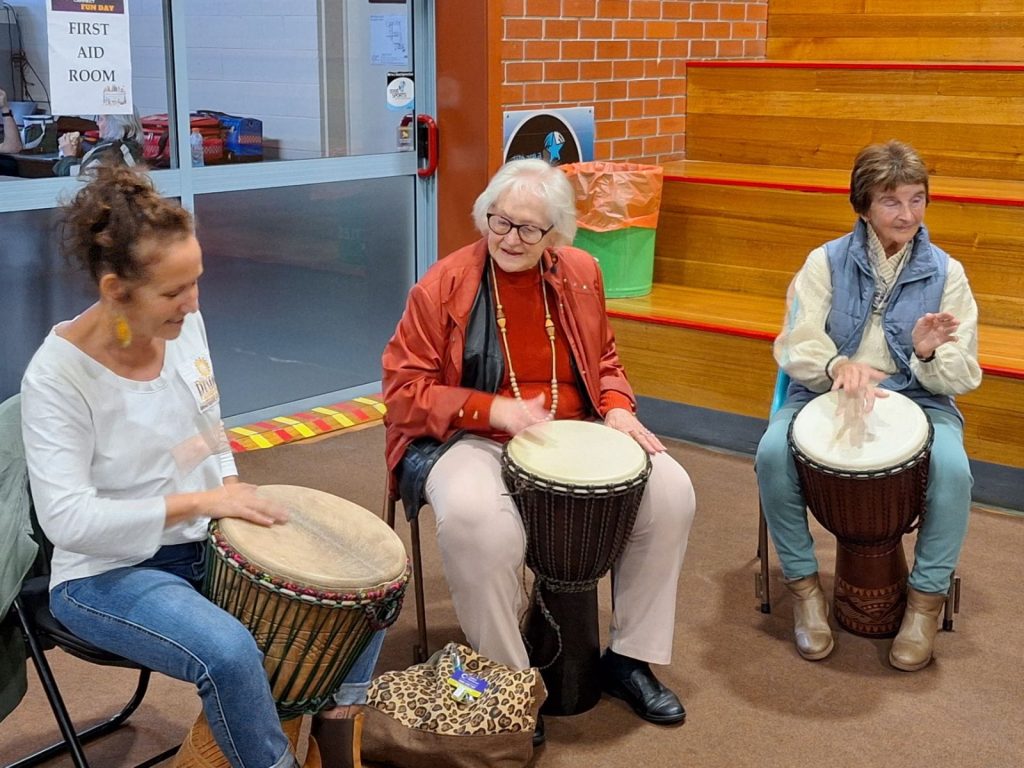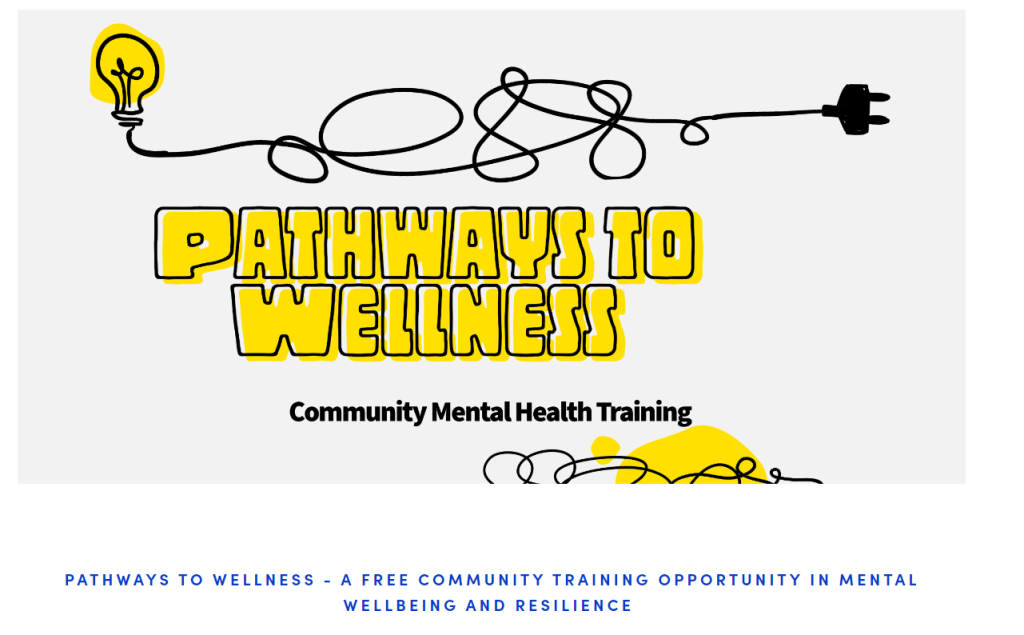Building resilience, building community
Posted on December 19, 2024

Community members at the Generations Connect Fun Day
How two organisations are strengthening wellbeing and resilience following bushfires and floods in the north and north-west of Tasmania
When we think of resilience, we often think of it in individual terms.
However, two community organisations—Council on the Ageing (COTA) and RANT Arts—are showing that resilience also comes from building strong community connections.
Both organisations have been working in communities in the north and north-west of Tasmania affected by the flooding events in October 2022, using funding from the Wellbeing and Resilience Grants Program.
This program was funded by the Australian Government through Primary Health Tasmania and delivered by the Mental Health Council of Tasmania to foster social connections, strengthen mental health, and promote community wellbeing.
Through innovative events and training, these organisations are helping to rebuild communities in the wake of adversity by focusing on mental wellbeing, resilience, and the power of social connection.
Resilience isn’t just about overcoming challenges—it’s also about fostering a sense of belonging and connection within communities.
For COTA, this was achieved by bringing generations together for fun, interaction, and the breaking down of stereotypes.
The Generations Connect Fun Day, held in Ulverstone in April, brought together over 360 participants from various age groups to enjoy a day of interactive activities designed to strengthen community ties.
Mel Knuckey, COTA’s Generations Connect project officer, says the day was about making intergenerational connections.
“We had a lot of different organisations come along to support the event and run interactive activities.
“We partnered with Respect Aged Care, who brought along residents. It was just really lovely to witness the connections being made.”
COTA CEO Brigid Wilkinson says there was also a broader purpose to the event.
“We know that this helps break down stereotypes about what it means to be older or younger.
“That’s really at the core of these activities—building connection and changing people’s attitudes towards different age groups.”
“We know from research that one of the top ways to combat ageism is through meaningful, person-to-person connection,” she says.
“These events provide a fun way for people to build relationships across generations and rethink what it means to age.”
Brigid explains that grant funding helped to make this event accessible, covering costs so participants could attend for free.
“This event was about providing a space for the community to connect, and the funding made that possible.”
It also helped ensure that events like these could continue in the future, promoting community resilience in times of difficulty.
The activities, which included everything from cultural weaving to drumming, gave participants a chance to engage with one another in fun and creative ways.
Brigid describes the drumming as one memorable moment with lots of intergenerational connection.
“There were residents from the aged care facility sitting across from young kids, and they were all getting into the drumming together,” she says.
“It didn’t matter how old you were—everyone just wanted to join in. We know that human connection helps strip away age stereotypes, and that’s exactly what happened.”
Mel said that a total of 366 people attended the event, including 173 children, 148 adults under 60 and 45 adults over 60.
“It was a real cross-section of the community, and that’s what we wanted—people of all ages connecting and having fun together,” she says.

For RANT Arts, resilience comes through education.
Its Pathways to Wellness program, funded by a Wellbeing and Resilience Grant, offered free online mental health and wellbeing training to residents of Tasmania’s north and north-west regions, which were significantly affected by recent floods.
The program focused on providing accessible e-learning opportunities that promoted mental health literacy and sought to empower participants to take responsibility for their own wellbeing while giving them the tools to do so.
Karen Revie, Pathways to Wellness program manager at RANT Arts, is passionate about destigmatising mental health and building mental health literacy.
“Our goal was to offer free mental health and wellbeing training that people could access at their own pace, from their own homes,” she says.
By making the course online, RANT Arts ensured that even those in remote areas could benefit.
The course, offered through Lifeline, covered topics such as managing stress, building resilience, and developing self-care strategies.
Karen explains that the course not only impacted the 20 participants but also their wider communities.
“We were able to offer 20 free places on the course, and it filled up within an hour of advertising,” she says.
“That’s a clear indication of the need for more accessible mental health training in these communities.
“The participants not only gained knowledge for themselves, but also for their families and friends.
“This creates a ripple effect—when individuals take care of their mental health, it positively impacts the people around them.”
Participants were able to complete the course at their own pace over six months, allowing them to fit it into their schedules including people who were not well enough to leave their homes.
One participant shared a key takeaway was the importance of self care.
“I need to be better at putting me first and knowing that how I feel matters too,” they said.
“I’m thinking more about myself and trying not to feel guilty for it. I’m trying to go for a walk every day, away from my responsibilities, so I have some time to myself. That little bit of time lets me clear my head a bit.”
Another participant said the format lent itself to their successful participation.
“I really liked that it was online,” they said. “I have bipolar disorder and I also get really bad anxiety.
“My GP said I can go to a psychologist bulk billed but cause I get really anxious leaving the house I’ve never done it.
“So this course really suited me cause I could do it at home.
“I’ve never found self care easy, especially if I am feeling really depressed. When I’m depressed it can be really hard to get out of bed and have a shower and cook.
“I think what I learnt is that it’s when I’m depressed, that’s the time I really need to do these things as they will make me feel better even if I don’t want to do it.”
The participant shared the following about whether this course helped build their wellbeing and resilience:
“When I was doing the course, I took lots of little notes about simple things I can do to take care of myself, which I am trying to do every day,” they said.
“I don’t think I knew what resilience really was before and if I had I don’t think I would have ever used that word to describe myself.
“I think after doing the course I have realised I am actually stronger than I thought I was.
Karen believes online learning is increasingly popular and accessible, especially for those living in regional areas.
“Self care and mental health education are not as accessible as they used to be,” she says.
The course aimed to not only provide knowledge but also empower participants to take control of their mental health and wellbeing, said Karen.
“By giving people the tools and knowledge to manage their own mental health, we’re helping to build resilient individuals.
“And when we have resilient individuals, we have resilient communities.
‘It’s about creating a network of support that people can rely on, particularly in times of disaster or adversity.”
Both COTA and RANT Arts have shown that resilience is more than an individual trait—it’s a community effort.
As Karen from RANT Arts notes:
“Self care is something we all need to learn.
“We’re often very good at taking care of others, but not ourselves.
“But if we don’t look after ourselves, we can’t effectively care for others.
“Building resilient communities starts with empowering individuals to prioritise their own wellbeing, and that’s what we’re striving for.”
This story features in Issue 19 of our Primary Health Matters magazine. Click here to read the rest of the issue.
